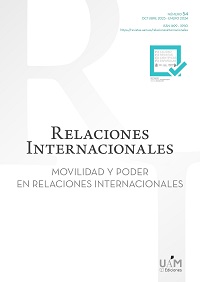Keywords:
Mobility, Power, International RelationsCopyright (c) 2023 Angela Iranzo Dosdad, Victoria Silva Sánchez

This work is licensed under a Creative Commons Attribution-NonCommercial-NoDerivatives 4.0 International License.
Abstract
This 54th issue of the journal International Relations starts from the need to recognise that movement, inextricably tied to stasis, is a constitutive force of politics and, therefore, of the power relations that shape our lives. As editors of this issue we seek to open up a critical reflection on movement that goes beyond the movement of goods, people and cultures, or in other words, that does not reduce movement to the mere outcome of particular government policies, capitalist logics or the social dynamics of globalisation. Our starting point is that movement is a product of, but also a producer of ways of organising and governing human and non-human life.
Downloads
References
Adamson, F.B. (2012). Constructing the Diaspora: Diaspora Identity Politics and Transnational Social Movements. En Lyons, T. y Mandaville, P. (Eds). Politics from Afar: Transnational Diasporas and Networks (pp. 25-42). Husrt & Company.
Adamson, F.B. y M.D. (2007). Remapping the Boundaries of “State” and “National Identity”: Incorporating Diasporas into International Relations Theorizing. Journal of International Relations, 13 (4), 489-526.
Adey, P. (2006). If Mobility Is Everything Then It Is Nothing: Toward a Relational Politics of (Im)mobility. Mobilities, 1 (1), 75-94.
Agnew, J. (1994). The Territorial Trap: The Geographical Assumptions of International Relations Theory. Review of International Political Economy, 1 (1), 53-80.
Aradau, C., y Blanke, T. (2010). Governing Circulation: A Critique of the Biopolitics of Security. En de Larrinaga, M. Y Doucet, M.G (Eds.). Security and Global Governmentality: Globalization, Governance and the State (pp. 44-58). Routledge.
Aradau, C., Huysmans, J., y Squiere, V. (2010). Acts of European Citizenship: A Political Sociology of Mobility. Journal of Common Markets Studies, 48 (4), 945-965.
Aradau, C. (2016). Political Grammars of Mobility, Security and Subjectivity. Mobilities, 11 (4), 564-574.
Aradau, C., y Huysmans, J. (2009). Mobilising (Global) Democracy: A Political Reading of Mobility between Universal Rights and the Mob. Millennium: Journal of International Studies, 37 (3), 583-604.
Bærenhold, J.O. (2013). Governmobility: The Power of Mobility. Mobilities, 8 (1), 20-34.
Cresswell, T. (2010). Towards a Politics of Mobility. Environment and Planning. D, Society & Space, 28 (1), 17-31.
Deleuze, G. y Guattari, F. (2004). Mil mesetas: capitalismo y esquizofrenia. Pre-Textos.
Faist, T. (2013). The Mobility Turn: A New Paradigm for the Social Sciences? Ethnic and Racial Studies, 36 (11), 1637-1646.
García, P. (2000). ¿Qué es esa cosa llamada Relaciones Internacionales? Marcial Pons.
Glissant, É. (1989). Caribean Discourses. Selected Essays. University Press of Virginia.
Glissant, É. (2017). La Poética de la Relación. Universidad Nacional de Quilmes.
Hobson, J.M. y Sajed, A. (2017). Navigating beyond the Eurofetishist frontier of critical IR theory: Exploring the complex landscapes of non-Western agency. International Studies Review, 19 (4), 547-572.
Huysmans, J. (2021). Motioning the Politics of Security: The Primacy of Movement and the Subject of Security. Security Dialogue, 53 (3), 238-255.
Ingold, T. (2015). The life of lines. Routledge.
Ingold, T. (2007). Lines: A brief history. Routledge.
Iranzo, Á. (2021). Sub-Saharan Migrants “in Transit”: Intersections between Mobility and Immobility and the Production of (In)Securities. Mobilities, 16 (5), 739-757.
Jensen, A. (2011). Mobility, Space and Power: On the Multiplicities of Seeing Mobility. Mobilities, 6 (2), 255-271.
Kynsilehto, A. (2021). Global Mobilities. En Väyrynen, T., Parashad, S., Féron, É., y Confortini, C.C. (Eds). Routledge Handbook of Feminist Peace Research (pp. 420-427). Routledge.
Lesse, M. y Wittendorp, S. (Eds.) (2017). Security/Mobility. Politics of Movement. Manchester University Press.
Lesse, M. y Wittendorp, S. (2018). The New Mobilities Paradigm and Critical Security Studies: Exploring Common Ground. Mobilities, 13 (2), 171-184.
Malaviya, S. (2020). Digitising the virtual: movement and relations in drone warfare. Millennium: Journal of International Studies, 49 (1), 80-104.
Malkki, L. (1992). National Geographic: The Rooting of Peoples and the Territorialization of National Identity among Scholars and Refugees. Cultural Anthropology, 7 (1), 24-44.
Mandani, M. (2020). Neither Settler nor Native. The Making and Unmaking of Permanent Minorities. Harvard University Press.
Manning, E. (2009). Relationscapes. Movement, Art and Philosophy. The MIT Press.
Manning, E. (2007). Politics of Touch: Sense, Movement and Sovereignty. University of Minnesota Press.
Merriman, P. (2012). Human Geography without Time-Space. Transactions of the Institute of British Geography, 37, 13-27.
Merriman, P. y Pearce, L. (2017). Mobility and the Humanities. Mobilities, 12 (4), 493-508.
Nail, T. (2019). Being and Motion. Oxford University Press.
Salazar, N. y Glick Schiller, N. (Eds.) (2014). Regimes of Mobility. Imaginaries and Relationalities of Power. Routledge.
Salter, M.B. (2013). To Make Move and Let Stop: Mobility and the Assemblage of Circulation. Mobilities, 8 (1), 7-19.
Salter, M.B. (Ed.) (2015). Making Things International I: Circuits and Motion. University of Minnesota Press.
Sheller, M. (2016). Uneven Mobility Futures: A Foucauldian Approach. Mobilities, 11 (1), 15-31.
Sheller, M. y Urry, U. (2016). Mobilizing the New Mobilities Paradigm. Applied Mobilities, 1 (1), 10-25.
Söderstrom, O. y Crot, L. (2010). The Mobile Constitution of Society: Rethinking the Mobility-Society Nexus. Maisson d’Analysis des Processus Sociaux (MAPS).
Soguz, N. y Whitehall, G. (1999). Wandering Grounds: Transversality, Identity, Territoriality and Movement. Millennium: Journal of International Studies, 28 (3), 675-698.
Suliman, S. (2018). Mobilising a Theory of Kinetic Politics. Mobilities, 13 (2), 276-290.
Thrift, N. (2004). Movement-Space: The Changing Domain of Thinking Resulting from the Development of New Kinds of Spatial Awareness. Economy and Society, 33 (4), 582-604.
Trownsell, T.A., Querejazu, A., Shani, G., Behera, N., Reddekop, J. y Tickner, A.B. (2019). Recrafting International Relations through relationality. E-International Relations.
Urry, J. (2000). Mobilities for the Twenty-first Century. Routledge.

